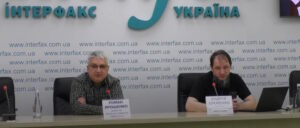
Ensuring the stability of the energy system and organizing international support are the tasks that Ukrainians believe the government is doing best. At the same time, the lowest ratings were given to the state’s efforts to fight corruption and manage the seized property of sanctioned persons. These data were presented by Active Group at a press conference at Interfax-Ukraine on Wednesday.
“Our research was focused on assessing public opinion, which is a key element in the process of governance. We decided to find out how and in what state public opinion is now regarding certain socially important issues,” said Roman Yaroshenko, director of the Foundation for Research for the Future.

He also emphasized that an important part of the research was to study attitudes towards various agencies and organizations.
In his turn, Andriy Yeremenko, founder of the research company Active Group, emphasized that modern technologies were used to analyze the survey results. According to the survey results, the statistical error does not exceed 2.2%, which makes the data quite representative.

“Answering the question ‘What tasks does the Ukrainian government do best?’ 29.6% of Ukrainians said that they are coping with ensuring the stability of the energy system, 26.6% – with organizing international support, 20.7% – with defense against Russian aggression. The last on the list were the tasks of fighting corruption: only 3.5% of respondents believe that the government has coped with this task; managing the property of sanctioned persons, which is handled by the Asset Recovery and Management Agency (ARMA) – 2.5%; and justice – 1.1%. A third of respondents (33.2%) believe that the government is not coping with any of the tasks, and one in five (21.3%) have not decided on the answer,” said Andriy Yeremenko.

To the question “What is your attitude to the seizure of assets of persons under sanctions in Ukraine?” 72.8% of Ukrainians answered positively, of which 50.9% were very positive, 21.9% were rather positive, and 12.6% were neutral. On the other hand, 3.9% of respondents have a negative attitude toward asset seizures, including 3.3% who are rather negative and 0.6% who are very negative. 10.7% of respondents have not decided on the answer.

To the question “In your opinion, how transparent is the management of seized assets in Ukraine?” 12.9% of respondents believe that it is transparent, of which 2% said it is completely transparent, and 10.9% said it is mostly transparent. However, 62.7% of respondents believe the opposite, of whom 35.1% said it is mostly not transparent, 27.6% said it is completely not transparent. A quarter of respondents (24.4%) have not decided on their answer.

Answering the question “In your opinion, how effective is the management of seized assets in Ukraine for the state?” 13.9% of respondents believe that it is effective, of which 2.2% said “completely effective” and 11.8% said “mostly effective”. On the other hand, half of the respondents (50.3%) do not think so, 43% of them said that management is mostly ineffective, 7.3% – completely ineffective. More than a third of respondents (35.7%) have not decided on the answer.

The respondents were also asked “Which of these bodies best contribute to Ukraine’s development?” According to the respondents, the Security Service of Ukraine (29.4%), the President (27.8%), and the local authorities of your city (20.7%) are the best helpers. The last places on the list are occupied by the Prosecutor’s Office (3.5%), the National Agency for the Prevention of Corruption and the Agency for Finding and Management of Assets Derived from Corruption and Other Crimes (3.3%). The fact that no government agency helps is believed by 36.4% of respondents.

The full presentation with the results of the survey can be downloaded here.
The research was conducted by Active Group using the SunFlower Sociology online panel. Method: Self-completion of questionnaires by Ukrainian citizens aged 18 and older. Sample: 2000 questionnaires (representative by age, gender and region of Ukraine). Data collection period: May 4, 2024.
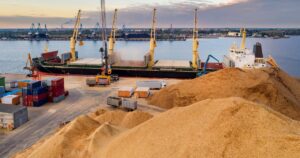
The flow of grain ships through the ports of Odessa Region is bringing long-awaited support to Ukraine’s economy. However, analysts warn that this may be a temporary phenomenon.
“In early March in Odessa, a 700-foot Liberian-flagged vessel slowly sailed out of the port, passing rows of yellow cranes and plunging into the calm waters of the Black Sea. Its hull was almost completely submerged as the ship was loaded with corn bound for Bangladesh. Meanwhile, other ships laden with grain have already left port, bypassing those that were just arriving,” the New York Times reported.
What seemed impossible last summer, when the Russian naval blockade paralyzed all commercial activity, is now a reality. The port was back on track thanks to a military campaign that drove Russian warships out of Ukrainian waters and provided a trade route for supplies to foreign markets.
Ukrainian grain and oilseed exports across the sea, which are vital to the Ukrainian economy, have almost returned to prewar levels, according to data provided to the New York Times. Over the past six months, Ukraine exported 27.6 million tons of grain and oilseeds across the Black Sea, only 0.2 million tons less than the average volume for the same period from 2018 to 2021 before Russia’s invasion in February 2022.
In the first quarter of this year, Black Sea exports even exceeded pre-war figures, according to Ukrainian data.
Grain and oilseed export estimates from Dragon Capital, a Kiev-based investment firm, and data from Lloyd’s List Intelligence, a shipping analytics firm, confirm this trend.
Sal Gilberti, head of Teucrium Trading, a U.S. company that trades agricultural commodities on the New York Stock Exchange, said claims by Ukrainian officials that grain exports across the sea are close to prewar levels are “accurate.”
Ukraine still faces challenges that could prevent grain exports from stabilizing at previous levels, including continued Russian attacks on port infrastructure and a reduced harvest this year. The U.S. Department of Agriculture predicts a decline in grain exports in the near future.
However, analysts say the overall environment is improving and freight companies are willing to transport Ukrainian grain despite the war. “The data shows there is no shortage of shipowners willing to take the risk and go for it,” said Greg Miller, senior maritime journalist at Lloyd’s List.
Maintaining high levels of grain exports is a strategic necessity for Ukraine. Grain and oilseeds accounted for a third of Ukrainian exports last year, said Natalia Spygotska, senior analyst at Dragon Capital. It has become critical to sustaining Ukraine’s economy and ultimately its war effort.
Tariel Khajishvili, head of Novik LLC, a Ukrainian ship agent operating in Odessa, said: “It is obvious that without grain exports, the country’s economy will collapse.”
After the invasion, Russia seized control of the Black Sea, blocking trade for months, jeopardizing global food security. In July 2022, a deal brokered by the UN and Turkey allowed Ukraine to resume exports through an agreed corridor in the Black Sea.
But a year later, Russia pulled out of the agreement and threatened all commercial ships traveling to or from Ukraine, leading to a complete halt to maritime grain exports last August.
To resume exports, the Ukrainian army launched a campaign to drive the Russian navy out of part of the Black Sea, destroying many warships and attacking their headquarters in Russia-occupied Crimea. The successful operation allowed Ukraine to create a new trade corridor along the coast that allows ships to enter the territorial waters of NATO countries.
Dmytro Barinov, deputy head of the Ukrainian Sea Ports Administration, recalls how nervous they were when the first grain ship passed through the corridor in mid-September: “We prayed that everything would go well.
Eventually, the ship successfully sailed into the open sea, and soon the “familiar pleasant sounds” of the ship’s sirens were again heard in Odessa.
The number of grain ships arriving at the three ports of the Odessa region – Odessa, Pivdennyi and Chernomorsk – increased to 231 in March from just 5 in September, according to Lloyd’s List.
Ukraine’s ship insurance arrangements with global insurers also contributed to the increase. Mr. Gilberti of Teucrium Trading added that Moscow is also interested in keeping the fighting out of the Black Sea, as it is also used to export Russian goods.
Today, Ukraine can only use ports in the Odessa region for grain exports, as other seaports are either too close to Russian positions or occupied by Russian troops. Despite this, with 4.1 million tons of grain and oilseeds shipped monthly, these three ports are close to pre-war export volumes.
The opening of the Odessa ports brought welcome financial relief to Ukraine. Having lost key economic assets during the war, such as steel mills in the east seized or destroyed by Russia, Ukraine is now more dependent on grain exports to support the economy. Dragon Capital predicted in the fall that a return to full operation of Odessa ports could add several percentage points to Ukraine’s GDP growth this year, which was forecast at 4 percent.
However, analysts warn that the initial success of Ukraine’s new trade route may be short-lived.
Russia continues to strike port infrastructure in Odessa, and with Ukraine’s air defenses in short supply, more missiles are reaching their target. In mid-April, Russia successfully struck two terminals in Pivdenne, destroying several containers.
Dragon Capital’s Ms. Spygotska also noted that high volumes of recent grain exports partly reflect shipments delayed by the Russian blockade, which could make it difficult to achieve those volumes in the future, especially with grain production projected to decline.
“Producers and exporters are now well positioned to export all available crops,” she said. “But it all depends on the harvest.”
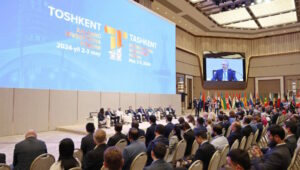
The III International Investment Forum (IIIF) successfully completed its work in Uzbekistan. The event gathered more than 2.5 thousand participants from 93 countries, providing a platform for global dialog and exchange of best practices in the investment sphere.
One of the key events of the forum was the presentation of regional energy projects (construction of Kambarata HPP-1 and Javan HPP) to foreign investors. The presentation was held with the participation of the Prime Ministers of the Republic of Uzbekistan and the Kyrgyz Republic, which emphasized the importance of these projects for the entire region.
The forum attracted the attention of international media and was covered by more than 110 foreign publications from 30 countries, including the world’s leading media: “CNN”, “Euronews”, “London Post” and “Associated Press”.
As a result of TMIF, agreements totaling $26.6 billion were signed, which is evidence of Uzbekistan’s high investment attractiveness and the success of the forum. For comparison, 167 documents worth $11 billion were signed at TMIF in 2022, which demonstrates a significant increase in investment interest in the country.
In particular, agreements were reached on the realization of the following major investment projects:
– “Data Volt” from Saudi Arabia will be engaged in the construction of urban infrastructure in “New Tashkent” for the amount of $1 billion, as well as create a “data center” based on green technologies for the amount of $3 billion.
– Saudi Arabia’s Acwa Power is implementing projects to build a 5 GW wind farm in the Republic of Karakalpakstan and create 2 GW of electricity storage capacity for a total of $6.2 billion.
– UAE-based Amea Power will implement a $1.1 billion project to build a 1,000 MW wind farm in the Republic of Karakalpakstan.
– Saudi Tabrid will start modernization of the heat supply system in Nukus, Fergana and Kuvasai at a cost of $750 million.
– Egypt’s Nil Shugar will grow sugar beets and produce sugar in Jizzak oblast at a cost of $500 million.
– The Chinese company Shanghai Knud International is implementing a $205 million project to produce textile and garment products in Namangan region.
– The company “Wilmar International” (Singapore) will produce food products and confectionery in Tashkent region to the amount of $200 million dollars.
In addition, the forum reached agreements with a number of the world’s largest companies, such as “Orascom Investment” (Egypt), “Bonafarm Grup” (Hungary), “Sayar” (USA), “Goldwind”, “Sinoma” (China), “Sam Yapi” (Turkey), “Pasha Development” (Azerbaijan), “Lasselsberger” (Austria), “Petrosat Chexelsoton” (Iran) on realization of new investment projects worth $6.6 billion.
The event included a rich program of panel sessions, discussions, business breakfasts and round tables where the most important aspects of economic development were discussed. The central topic was the role of the government, investors and entrepreneurs in supporting small and medium-sized businesses.
At the session devoted to anti-corruption, experts emphasized that the effective fight against corruption and crime in the economy is a key factor for improving the investment climate. They noted that creating a safe and transparent business environment plays an important role in this process.
“A successful fight against corruption requires a comprehensive approach that includes strengthening legislation and increasing transparency of government actions,” said Akmal Burkhanov, director of the Agency for Countering Corruption of the Republic of Uzbekistan.
The session devoted to retail trade outlined the main challenges and opportunities for the industry. The participants expressed their opinion on the need to improve tax legislation and simplify import procedures. They also noted that it is important to create conditions for successful adaptation of new brands on the market.
“Thanks to the decree on the reduction of customs duties, we managed to set fair prices like in the UK and Kazakhstan,” shared Ilya Lyapustin, Sales and Marketing Director of Tashkent City Mall.
The business breakfast dedicated to women’s entrepreneurship emphasized the significant impact of businesswomen on society. Speakers presented inspiring examples and strategies for striking a balance between profitability and social responsibility.
The focus was on attracting foreign investment through residence permit programs.
“Over the past few years, Uzbekistan has established itself as an attractive destination for global investors due to its openness to cooperation and prospects in the real estate sector,” said Akram Mukhamatkulov of Henley&Partners.
The roundtable “Supply Chains and Sustainability: finding a balance in the face of uncertainty” discussed the challenges and strategies to ensure the sustainability of global supply chains.
“Turkey and Uzbekistan have a strategic partnership, and we can significantly strengthen cooperation by working together,” said Turkish Deputy Trade Minister Sezay Ucarmak.
The experts also emphasized the importance of integrating digital technologies into investment strategies. They noted that digitalization is not the future, but already today, and plays a key role in accelerating investment processes and increasing transparency.
At the pitch session “IT-PARK Uzbekistan: New Development Prospects”, plans to turn Uzbekistan into a regional center of information technologies by 2030 were presented.
Sherzod Shermatov, Minister of Digital Technologies of Uzbekistan, spoke about the significance of recent investments. “Yesterday we witnessed an important event – the start of construction of the $5 billion Data Volt green data center, which is a major foreign direct investment project. We are creating a favorable environment for IT companies and launching a Zero Risk program to cover all risks associated with opening and running offices in Uzbekistan,” he said.
At the round table “Connections: Revival of the Great Silk Road”, international experts and representatives of state bodies explored opportunities to expand ties, economic cooperation and cultural exchange along the ancient routes of the Silk Road.
At the roundtable “Integrated Urban Planning: Quality Investments, Comfort for Environment and People”, leading urbanists, architects and representatives of the business community discussed approaches to the development of the city of Tashkent. In particular, BCG Managing Director and Senior Partner Vladislav Butenko emphasized the importance of integrating innovative solutions into urban planning to achieve sustainable urban development. He emphasized that both economic and social aspects should be taken into account in integrated planning, ensuring a balance between them.
The Forum has played an important role in attracting investments for various ministries and regions of Uzbekistan. The agreements signed demonstrate the development of key sectors such as industry, energy, pharmaceuticals and automobile manufacturing.
One of the main achievements of the forum was the agreement between the Ministry of Digital Technologies, the Ministry of Energy and IT company Data Volt on the construction of a data center based on “green” technologies. Experts noted the importance of such projects for Uzbekistan. Minister of Investment, Industry and Trade Laziz Kudratov and Data Volt director Rajit Nanda took part in the signing ceremony.
The III International Investment Forum in Tashkent has come to an end, but the planned initiatives and signed agreements promise active work on attracting investments and ensuring sustainable development. Uzbekistan has reaffirmed its role as a strategic partner in the international arena, attracting the attention of global investors and contributing to the economic growth of the region.
The forum was also attended by representatives of Ukraine, including pharmaceutical business and agro-industrial complex.
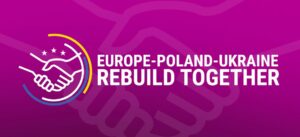

?⚡️ We invite you to participate in the conference “Europe-Poland-Ukraine: Cooperate Together”! ?
➡️ Date – May 23, 2024
➡️ Venue – Hyatt Regency, Kyiv.
Do not miss the exclusive opportunity to learn about the state and prospects of Polish-Ukrainian cooperation in the transport and logistics sector, the pharmaceutical sector, the public-private partnership segment as a tool to promote mutual investment, as well as to establish B2B contacts between Polish and Ukrainian businesses. The conference will be attended by entrepreneurs from Poland and Ukraine, representatives of non-governmental organizations, business communities, experts✅.
Registration: https://docs.google.com/forms/d/1LlPPFFplNfe_hkbAW7lNE7lMz238GQavwD2-ZbVyWqM/edit
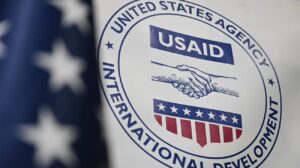
The United States Agency for International Development (USAID) is allocating 60 million dollars to support Ukrainian agriculture, USAID Deputy Administrator Isobel Coleman has said, Radio Liberty has reported.
According to Coleman, the aid package is aimed at implementing a new Harvest program to mitigate the impact of Russian aggression on agricultural production in Ukraine.
“The program aims to help Ukrainian agrarians improve production efficiency, make it more resilient and competitive in times of war, and along with that lay the groundwork for long-term sustainable development of the Ukrainian agribusiness sector. Under Harvest, USAID will help create a regulatory and business environment in Ukraine that unlocks the potential for innovation and helps leverage private business resources to help Ukrainian agribusinesses continue to feed their country and many other countries around the world,” USAID said.
Coleman noted that the Ukrainian agricultural sector remains one of the main drivers of the Ukrainian economy – in particular, it contributed more than 60 percent of export revenues in 2023. USAID adds that the Harvest program will be part of the Agriculture Sustainability Initiative in Ukraine (AGRI-Ukraine). Since July 2022, the Agency has invested more than $350 million in it, attracting another more than $370 million from other donors.